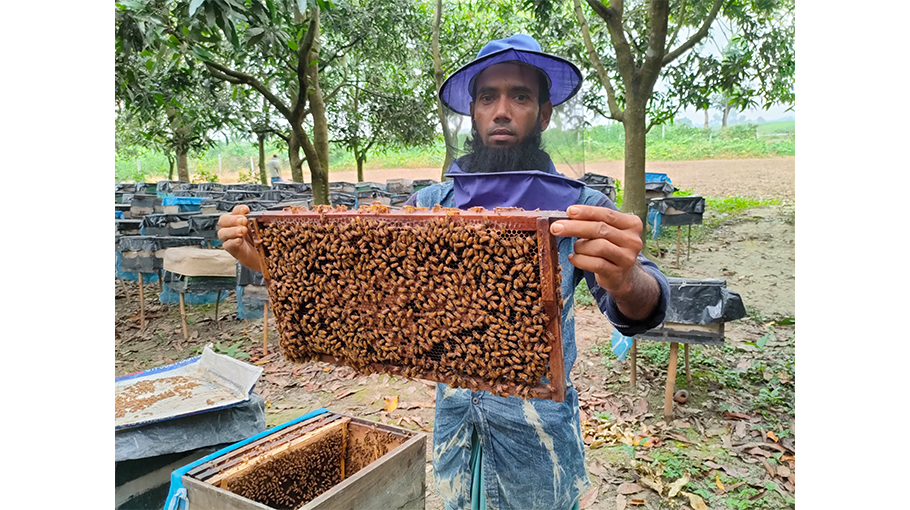Honey farming becomes popular in Chuadanga

Honey farming has improved the overall agricultural scene in Jibannagar Upazila of Chuadanga district. Row upon row of boxes of portable bee hives can be seen adjacent to agricultural fields in the area. Numerous bees are flying in full bloom. Bees can be seen flying around the boxes. Moreover, through this, tonnes of honey is being extracted. Not only is the honey being extracted, but the bumper yield of the crop is being pollinated by the swarming bees. In other words, farmers are benefiting from bee farming in two ways.
Honey farmer Ayez Kuruni (36) collects honey in different seasons. He has been cultivating honey for the last 12 years since 2010. Ayez Kuruni, who could not complete his study due to poverty, now earns 2 to 3 lakh Tk a year. He got the initial idea of honey cultivation from a private company in Satkhira. After that, he has become self-sufficient by collecting honey with bees through untiring work. By cultivating honey for 12 long years, Ayaz Kuruni has gained a lot of popularity in his area. Ayesha Kuruni's journey started in 2010 with only 40 boxes of honey. Now his farm has more than one and a half hundred boxes of honey. Each of which costs 7 to 8 thousand Tk. He produces about 7-8 tons of honey a year and sends it to different parts of the country, besides supplying honey to various companies including SKF Pharmaceutical Company. Seeing his success, the unemployed youth of the area are showing interest in honey cultivation.
On the spot, he visited a mobile bee farm set up in a mango orchard in Baidyanathpur village of Jivannagar upazila of Chuadanga and talked to Ayaz Kuruni. He said, “I started collecting mustard flower honey in 2010 by buying only 40 boxes of honey for 1 lakh Tk. Later I have been cultivating honey commercially. At present, I have 3 collaborators in my honey farm. This year more than 6 tons of honey will be available. Although Ayez Kuruni is a resident of Satkhira district, he collects honey not only in the village but also in different areas.
He said he has 100 double boxes and 50 single boxes. The two storey box has 12 frames each and the single box has 8 frames each. Each frame contains one and a half to two thousand bees. Each frame of the boxes is given a queen bee. If there are two queen bees in a frame, all the bees will fly. An average of 600 kg of honey per week is obtained from these boxes.
The box is specially made of wood for collecting honey. The upper part of which is wrapped with colored polythene and sack. The boxes are then lined up next to the fields of mustard, sesame, cumin, cool or litchi depending on the season. Mustard flowers yield more honey. The quality is also good.
He said that it is possible to earn income from portable bee hives from November to June. From July to October, bees cannot collect food because there are no flower arrangements. At this time they have to provide artificial food. Due to the unfavorable weather, other food and medicine including sugar worth Tk 8,000 to Tk 10,000 per month have been taken this season. In this way you have to give food for 5 months.
Ayaz Kuruni said that hard work is required to cultivate honey in this way. My 150 boxes now contain Meliferia bees. It comes in three types. Male, female and worker bees. Workers collect honey from bee flowers and bring it in boxes. And the job of the male and female bees is just to breed. Inside the box, wax boxes with wooden frames are lined up on the side of the field. I put the mustard in a row next to the field. In addition to mustard flower honey, I also collect honey from black cumin and litchi flowers.
Traveling honey farmer Ayez Kuruni said, “We have started honey cultivation since 2010. How much honey we have produced so far is impossible to calculate. At least 30 to 40 tons of honey has been produced. I have sold honey worth around Tk 1 crore in different areas including Dhaka, Sylhet, Chittagong and Jhenaidah. Last year I sold honey at Tk 400 per kg. Tree honey collectors collect bees by pressing. The quality of honey is lost 40 percent. And on my farm I collect with the help of machines with air. In this our sweet qualities remain intact. There is a huge demand for pure honey in the market.
Achieving success, Ayez Kuruni plans to build more than a hundred bee boxes next year. The wheel of fortune has changed a lot since he started cultivating honey. At present he is very much self-sufficient. He said that those who want to become entrepreneurs must first learn honey cultivation. No business can be successful without its own experience.
Mohammad Ali Jinnah, deputy director of the Chuadanga Agricultural Extension Department, said the interest of unemployed youth in beekeeping has increased. In addition to mustard flowers, nomadic beekeepers are concentrating on extracting honey from Kalijira, litchi and forest flowers. This is increasing beekeeping and honey extraction. Those who are cultivating this honey are not permanent in our area. They are cultivating honey on the go. Beekeeper Ayaz Kuruni has set an example in the district by keeping bees and producing honey. The demand for pure honey is huge in the market. However, if a person cultivates honey commercially with training, it is possible to benefit.



